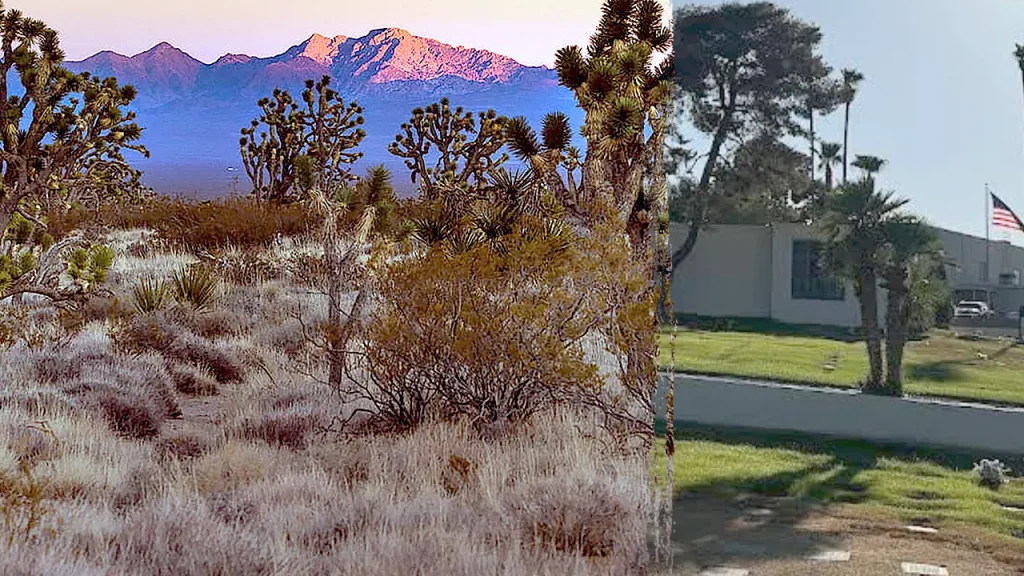Human Remains in the Desert: A Community’s Response to an Unsettling Discovery
In a desolate stretch of Nevada desert near Searchlight, approximately an hour south of Las Vegas, a disturbing discovery has prompted both investigation and compassion. What began as one local resident’s chance encounter in July has evolved into a solemn recovery mission, raising questions about respect for the deceased and the proper handling of human remains. The finding of over 300 piles of cremated human remains—pulverized bone fragments known as “cremains”—scattered across public land has sparked an investigation by federal authorities and local law enforcement while highlighting the importance of dignity in death.
The discovery might have remained unnoticed had it not been for a passerby who stumbled upon the unusual sight during a desert excursion in July. By August, officials from the U.S. Bureau of Land Management (BLM) confirmed what many had feared—the scattered piles contained human cremated remains. The confirmation transformed what might have been dismissed as desert debris into something far more somber: the final resting place for hundreds of individuals whose remains appeared to have been deposited without ceremony or proper notification. The remote location, while peaceful in its isolation, raised immediate concerns about how and why so many human remains would be found in such a manner.
As news of the discovery spread, Palm Mortuaries and Cemeteries stepped forward to address the situation with dignity. On Wednesday, their crews methodically recovered approximately 315 piles of cremains from the desert site. Celena DiLullo, president of Palm Mortuaries and Cemeteries, expressed the company’s commitment to ensuring these individuals would not be forgotten or abandoned. “It’s important to our community and our profession that we demonstrate how much we care about these people,” DiLullo told local media. Rather than leaving the remains where they were found, Palm Mortuaries arranged for their transfer to a cemetery crypt—providing a proper resting place for those whose journey after death had taken such an unexpected turn.
The investigation into how hundreds of cremated remains ended up scattered across BLM-managed land continues, with both the Bureau of Land Management and the Las Vegas Metropolitan Police Department working to uncover answers. Early reports suggested the possibility that the ashes may have been dumped by a commercial funeral home business, though no suspects have been identified and no connection to a specific mortuary has been confirmed. The case highlights the complex interplay between legal permissions and ethical considerations. Under Nevada law, individuals are permitted to scatter ashes on public land, and there is no general prohibition against the scattering of cremated remains. However, BLM regulations specifically forbid the commercial distribution of cremated remains on federal land—a distinction that may prove crucial as investigators continue their work.
What makes this case particularly poignant is the contrast between the unceremonious manner in which the remains appear to have been left and the respectful recovery now underway. For families who entrust funeral homes with their loved ones’ remains, there is an implicit understanding that those remains will be handled with dignity and in accordance with either family wishes or professional standards. The discovery of hundreds of cremains in the desert raises uncomfortable questions about whether that trust was honored in these cases. Were these individuals scattered with intention and respect, or were they abandoned in violation of both regulations and ethical standards? The answer may determine whether this was simply an unusual burial practice or something requiring accountability.
The recovery and relocation of these remains to a proper cemetery crypt represents more than just a logistical operation—it embodies a community’s commitment to ensuring dignity for the deceased, regardless of the circumstances. As Palm Mortuaries transfers these individuals to a more formal resting place, they affirm a fundamental principle: that every person deserves respect in death as in life. While investigators continue searching for answers regarding how and why these remains came to rest in the desert outside Searchlight, the community’s response demonstrates that even when proper protocols may have failed, human compassion can still prevail. The desert may have temporarily served as an unmarked cemetery for hundreds, but through the efforts of concerned citizens, government agencies, and funeral professionals, these individuals will not remain forgotten in the Nevada sand.


